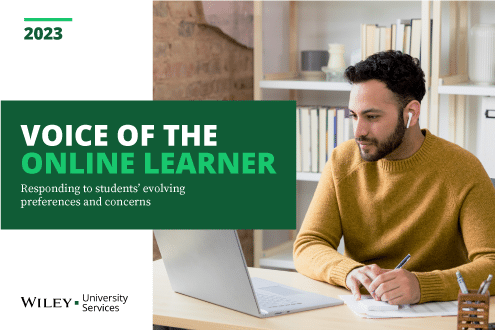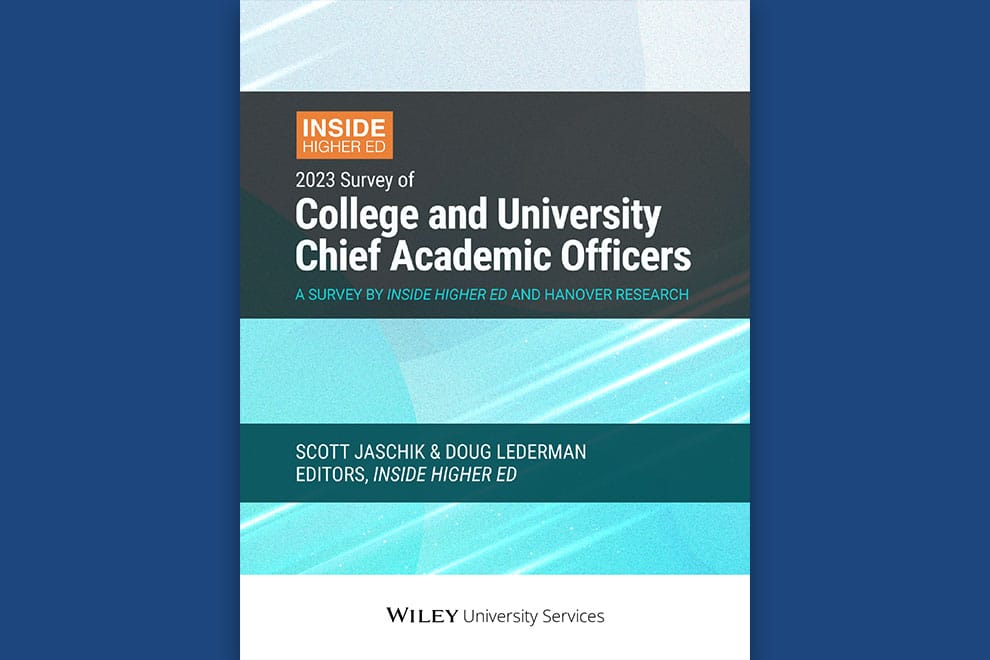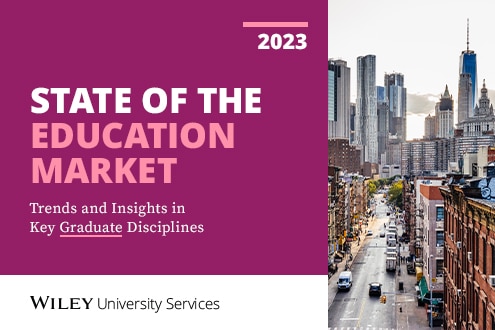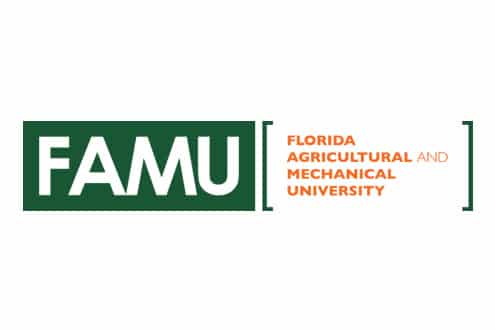Speaker 1:
You’re listening to An Educated Guest, a podcast that brings together great minds in higher ed to delve deeper into the innovations and trends guiding the future of education and careers, hosted by the executive vice president and GM of Wiley University Services and talent development, Todd Zipper.
Todd Zipper:
Hello, I am Todd Zipper, host of An Educated Guest. On today’s show, I speak with Steven Butschi head of education at Google Cloud. Steven has been with Google since 2009, where he has helped bring Google technologies to K12 and higher education institutions. After managing part of the K12 education sales organization, he’s now the lead for education within Google Cloud.
Todd Zipper:
The key takeaways from our discussion today, first, how Google listened to the needs of educators and consumers to invest in an ecosystem of lifelong learning from their own certificates, to traditional degree programs with partner universities. Second, how Google’s new employer recognized certificate programs compare to typical [inaudible 00:01:00] courses. Third, how Google is using a machine learning approach, predictive analytics and the user search experience to improve the educational process. Fourth, the different ways Google is personalizing higher education with AI from advancing DE&I to financial aid support.
Todd Zipper:
Hi, Steven. Thank you so much for being here today on An Educated Guest.
Steven Butschi :
Thanks for having me. I’m excited to chat.
Todd Zipper:
Me too. I’m excited to discuss some of the innovations in education happening at Google. Let’s get started. It appears that most of big tech started investing in education around the use of their own products. I believe Google did so as well, but I know so much has expanded since the original investment. Can you really lay out for us? What is Google focusing on in education? I know around K12 and post-secondary education is both a focus.
Steven Butschi :
Yeah. Excellent. As you probably know Google has actually started the university when Larry and Serge were grad students at Stanford and then obviously rolled out our consumer search product. It wasn’t actually until maybe 2006, I’d say, when we created our first enterprise education product. The reason was, is educators were telling us that they loved our consumer Gmail product and Docs, but it needed some enterprise features and functionality. In 2006, we launched Google Apps For Education, which we now call Google Workspace. I believe it was Arizona State. I think sometimes Arizona state and Northwestern both say that they’re one or two and we leave it up to them on who was truly number one, but they were both instrumental in helping shape with us what that offering was. Then from there, it started to expand.
Steven Butschi :
In 2011, we launched Chromebooks, which have now become the number one device in many classrooms across the globe. Then in 2014 we launched Google Classroom. It was interesting too, as we launch these products, what we try to do is figure out … As opposed to taking something that’s really fully baked and putting it out in the market, we say, what are the two to three pain points that we can really solve, push something out, and then we start to get a whole bunch of feedback. That helps us prioritize our roadmap, but it was fascinating launching Google Classroom because we’d given teachers and professors cameras. We said, “Record. Whenever you are super frustrated, let us know what’s going on.” That some great footage, by the way, of like teachers begging on copiers and such.
Steven Butschi :
It’s been an amazing way of developing product that really responds to what people need, as opposed to what we think they need. From there, in 2017, we launched our Google Cloud offering for education and programs to support researchers and universities on Google Cloud. It’s been a really great, now I guess, 16, 17 years since we’ve launched the first education product with Google Apps For Education and have a pretty large portfolio.
Todd Zipper:
Yeah. It’s really incredible. What do you think is really the driver of being in education? Is it just another line of business to be in, or is there something deeper around sort of the core product? Oftentimes things come from that original core, like you mentioned, Search. Is there a contiguous nature to the educational products from the original core consumer offering?
Steven Butschi :
Yeah, I think there’s three reasons why I really view Google as an education. I think first is that it provides an amazing impact. I wish when I was in school, I had access to Google Docs to be able to collaborate and learn from others and my peers and share and take notes together. For us, there’s some machine costs, but the impact that we see in classrooms is well worth the subsidization that we do of that. I think, then to your point, it really matches with the mission of ensuring that the world’s information is universally accessible. You think about how Search really changes, as consumers, how we find things, and it’s equally powerful in education. If learners have the opportunity to find information and take advantage of that. That’s really powerful and important. So it does align really core with our mission.
Steven Butschi :
There are paid products that schools can purchase, which help us fund building even more education-specific tools. But as you’ll see, we give away a lot of the core tools for free like Google Docs and Gmail. As I mentioned, we have some programs for Google Cloud Platform, et cetera. Really, it’s impact driven. Mission alignment really drive us quite a bit. There are some, some paid pieces that really get used and that money gets used to refund investment education for the product development.
Todd Zipper:
Can you give us a sense of some of the scale of these different product lines? You kind of mentioned with Chromebooks, I think, maybe the market leader now in that category. How should we think about sort of the scale? Eventually, I want to jump into Google Cloud, which I know is a big part of your focus and seems to be a huge area of growth in Google Education. But it would be great to get some sense of scale around these products.
Steven Butschi :
Yeah, certainly. Chrome is the number one device in the United States and several other countries; UK, Australia … I don’t know the exact number off the top of my head, but you pick any continent and there’s several countries there where it’s the number one device in the classroom. Then in addition to that, on those Chromebooks and even not Chromebooks exclusively, other technology products, we have hundreds of millions of users using Gmail and Google Docs and Google Classroom, et cetera. There is a pretty large scope. Then we’ve got lots of research universities using Google Cloud Platform, even K12 districts, ed tech companies use Google Cloud Platform as well. There’s really a large ecosystem approach to software platforms, infrastructure as a service, tools and even devices that wrap around that.
Todd Zipper:
Great. You mentioned accessibility earlier, just a kind of a core tenant of Google. I want to jump into one of the newer areas that Google’s investing in education, specifically the Grow With Google initiative. For me, I’ve been obviously following the story of many big tech companies that have sort of gone from enabling education through all the different technology products they have to, in some cases, building and delivering the education. Grow With Google seems to be this latest foray into this.
Todd Zipper:
I know the CEO recently announced a hundred million fund essentially to really help underserved, I guess, folks really, without a traditional degree, get jobs mostly in sort of technology or digital skills related areas. It would be great to get us to understand … This seems to be going beyond just an enabler, but actually to really go down the last mile of education of sort of that content, helping to somehow deliver that education by making it hugely accessible. Then finally, even with some of the job aspects, by the partnerships that you’ve recently done through Grow With Google, some of the nonprofits. I’d love to hear a little bit more about that for our audience.
Steven Butschi :
Yeah. It’s been fascinating to watch. When I was, for example, in school, there was little talk about machine learning and artificial intelligence. AI was speaking the other day with a PhD candidate and structural engineering, and he was talking about how he is using machine learning in his dissertation. I thought, “Wow. Times have changed.” But what we realize is that there’s so much development in terms of technology and how quickly our society is changing, that really learning is a lifelong process. It’s not just get your degree and then you work for 40 or 50 or 60 years. What we’re thinking about, from a Google perspective, is how do we support that lifelong learning journey and making it so that, for example, if someone does graduate 20 years ago and then decide they want to make a pivot and learn a new skill or add it … Or if they’re currently in college, even they want to add a credential on top of what they’re currently pursuing from a degree perspective, or it could be someone that doesn’t go into a traditional four or two year program, but instead stacks credentials as an alternative.
Steven Butschi :
There’s so many opportunities to make learning much more personalized and flexible. So that’s one reason why we’re really interested in how we can support that from a Grow With Google perspective in offering their certificates. But also there’s a large push from the Google side on our commitment to economic opportunity. Right now, Google Career Certificates provide job seekers with access to more than 1.5 million in demand jobs without necessarily needing a college degree or prior experience in that field. For example, it could be in data analytics or digital marketing, in e-commerce, IT support project management, UX design, and it goes on. These hands on certificates are both taught and developed by Google employees and they can be completed in three to six months time. It really gives that flexibility to support economic opportunity by connecting these students with careers pretty quickly and can recognize all their ability to learn these new skills and qualify for jobs that they might not have considered before.
Todd Zipper:
Yeah. This really taps into the skills based hiring movement that you’re increasingly seeing. One thing I want to jump into really is around the efficacy or the outcomes of these types of programs. It’s my understanding a lot of this type of education is being delivered through a MOOC platform or a MOOC-like platform. At least a couple of the certificates are with Coursera, for example. Historically the MOOCs have not been known for their high completion rates. It’s a very different type of experience, because it’s low cost, in some cases, no cost. Maybe you could walk us through how you’re thinking about not just trying to get this accessible, like you’ve obviously done with Search and so many other products to hundreds of millions, if not billions of people, but really trying to get that individual you’re talking about into that new job with a livable wage in a career trajectory that they’re looking for, because that’s that last mile piece that’s really tricky.
Steven Butschi :
Yeah, definitely. There’s two points that I’d make on that. The first one is, as you mentioned, there are online programs like Coursera, which is more geared an individual learner. We’ve also been thinking about partnerships with institutions. For example, Northeastern and Purdue have started to roll out some of the Grow With Google certificates. What’s fascinating to me about that is that it also aligns then where a student could be taking one specific degree, but then if they add on the certificate, it makes them even more valuable to the job place and the job market. We’re thinking about how do we expand the partnerships across universities, colleges, community colleges, online MOOC platforms, like you mentioned, there’s so many opportunities that doesn’t … It’s not a one size fits all. It can be layered in across multiple different areas.
Steven Butschi :
I think that also, to your point on completion rates, it helps because it provides, for example, we can look and see if a student is just pursuing it on their own, via Coursera, or if it’s tied into a community college curriculum with a professor that could help increase completion and outcomes. The other piece, though, and what’s really important is seeing the value of that credential. That’s where I think the difference between taking certain things online and others is how am I going to apply this? What’s great about the Grow With Google certificates is that they’re already recognized by a consortium of employers. So it really makes it very tangible so that when someone finishes that certificate, they know via these employer partnerships with Google, Walmart, SAP, Four, T-Mobile, Wells Fargo,and so many more, that it’s going to be recognized. I think that also provides a really good care that increases that completion rate, but also really leads to outcomes for those learners.
Todd Zipper:
It sounds like you’re taking quite an ecosystem approach where certainly you can market it directly to learners through some of the platforms we discuss. You can market it through universities that are sort of stacking it on within their existing products. My guess is also, through these employers, you just mentioned, also could be providing this education to their employees as well. Is that kind of how you’re thinking about it?
Steven Butschi :
Definitely. I think it ties in too, what we were discussing earlier on lifelong learning. Is that we recognize it’s not just certificate for someone who’s 20 or someone who’s 40. It could be at any point of their career, or before their career, where they realize that this skill will help them in getting the job that they want or the seller that they want or whatever it may be.
Todd Zipper:
You’ve mentioned some of these universities and I want to jump in here, because I know you’ve got a lot of great collaborations going on and something right in your wheelhouse is the initiative that I believe you’re applying your artificial intelligence at Walden University and Southern New Hampshire University, really well known, big, online universities, as well as working with Georgetown to launch a master’s in strategic digital transformation. It seems like you’ve got a lot of things going on sort of within the traditional university framework. Can you kind of talk us through the components of that?
Steven Butschi :
Yeah. It’s been fascinating to me, over the course of the pandemic, on how much digital transformation has been happening in the education space. I think that at the beginning of it was probably a little overwhelming, in fact, a lot overwhelming for many folks transitioning to online courses in the matter of days or weeks. But it has been fascinating to see that I think there’s this new found interest or at least acceptance of the idea, we could actually do more than maybe we thought we could do it, or we could … We’re not as change averse as we once thought that we were, after we survived that quick change in the pandemic. It’s been fascinating as the conversations that result from that on how do we really give an outstanding educational experience? There are students who are demanding, as they’re digital natives or as they are used to living in their consumer lives or even in their work lives with a lot of technology. Then coming into certain campus settings like, “Oh, this feels a little outdated.”
Steven Butschi :
It has been fascinating, as we’ve been working with universities on how can we help them as they reimagine enrollment admissions process and also provide avenues for student support. We know, as we’ve talked about, that education is not a one size fits all approach. This process of helping them adapt for those students, and that’s exactly, for example, at Southern New Hampshire is how can they create personalized pathways? It’s not just one B degree program and you have to go take this course, and then this course, and then this course. How can you stack all these different sorts of courses at the right time and in the right speed for you, that then aligns to the specific outcome that you’re looking for. Usually, we think of an outcome as like I’m going to get my bachelor’s in mathematics, but maybe the outcome for you is, I want this specific type of job and then you can work backwards and that’s where using the power of data analytics and understand what the job market’s looking for and then providing personalized pathways with AI interactive tutors that it can start to help guide those students along that path.
Steven Butschi :
Then at Walden, interestingly, in a more micro level, we’ve gone into specific classes and said, “If we really think about lifelong learning, that means that there’s going to be people on different life stages and maybe they have different jobs or kids or whatever it is.” TA office hours at 4:00 PM doesn’t work for them. How can we give them a personalized tutor at two in the morning, that compliments what they’re learning with the professor during the day and use that tutor to test or quiz or interact with them on content. It will personalize and recommend different extra materials to help them understand and better engage with their course. There’s a ton of opportunity, I think, for us to use this powerful technology. Combining that with the fact that they think there’s also a lot of interest on the institution side of how do we give a better student experience to our students after the pandemic. It comes together really nicely to fuel some really interesting and great projects.
Todd Zipper:
Yeah. I was looking at your one pager on Google Cloud on your website. It’s pretty incredible. I mean, even just seeing the term student success services is not something I would’ve expected to have seen from Google. Frankly, something that my company, Wiley, performs as well as many others, but I think it’s fantastic because you’re really bringing scale and technology to bear in areas like enrollment and admissions management, which by the way, schools are frankly really struggling today with sort of coming out of the pandemic. Enrollments have been down across the board. Getting better solutions that understand data, that can scale, that have to be so human reliant, in some cases, is huge. I also read a couple of the testimonials like strategic education, 24/7, virtual agents handle 93% of live chat volume. I mean, that’s pretty incredible. Is there any other examples that you guys are really thinking about experimenting with to sort of provide some scale in technology solutions into the market?
Steven Butschi :
You did your homework, Todd. By the way, it sounds like we need to be doing more partnering together as well.
Todd Zipper:
Absolutely.
Steven Butschi :
We’ve already got some good discussions. But I think that there is so much power to bring this technology out. I speak a lot in metaphors and analogies, so I apologize in advance and bear with me. But it’s almost like we’re giving a car, but where you go with that car and how fast you drive it there … There’s a lot of things that you get to control. It’s interesting because some of that underlying technology that’s powering strategic educations bot, it can be used in a very different way. For example, Penn State World Campus was using it for academic advising. As opposed to financial aid support, they were helping students in answering academic advising questions.
Steven Butschi :
Then I think about how that could be applied. I was mentoring a student in the New York City public schools. I think the ratio of students to counselor is like 1 to 300 or 1 to 500. I mean it’s just not enough. How do we supplement that human support and start to triage things so that you could have an AI tutor that’s helping as soon as they apply for college and work through different application processes. Having gone through that with my mentee, trying to understand the [inaudible 00:18:16] is no easy feat and then really freeing up that counselor to dig into the really complicated questions that the chat bot just isn’t going to be able to leverage, or the AI tutor. I think there’s a ton of great examples of how we can apply the technology into multiple different use cases.
Todd Zipper:
Yeah. One area that I feel like has not seen a lot of revolutionary technology insights is around teaching and learning. Consumers are going through this process now, there’s so much data and yet we still have so many students dropping out in the courses from one course to the next that schools cannot find. I just read a statistic that I think we’re up to 39 million Americans with some college, but no credential, which is really sad, at the end of the day. Is that really on your radar here to sort of try to provide those insights to faculty and administrators so we can make some real time changes to keep students in classes?
Steven Butschi :
Definitely. We’re actually taking a partnership approach on this piece as well. There’s a not for profit started by several R1s called Unison Data Platform. Their whole being and the mission is to start to collect this data from different systems and add it into a BigQuery lake that they can find interesting insights. University of Michigan is a member of Unison Data Platform, they’re using Google Cloud then to understand, in classes, how can we surface what the most successful students are doing to those other students? They could say, “Oh, this is the number one resource that we have students using. I haven’t looked at that. I should check that out.” It’s called the My LA Project. There’s a ton of opportunity to use data to better support students, guide them, give them the right resources at the right time.
Steven Butschi :
I think another piece of your point that you called out was just the cost of education. There’s so many ways that, not only can we help, on one side, help students persist and continue and provide the right support, but also where can we also reduce costs for students too. There’s so much of that goes into running operations beyond just the teaching. It’s operations behind the scenes. That’s where helping universities and colleges to understand where can they use technology to help reduce some of that and gain efficiencies in some of those costs too.
Todd Zipper:
I want to stick with Google Cloud just because Wiley is also a big research publisher. We’re the third largest in the world. I noticed that you all are empowering a lot of the life science research that’s out there. Really most of it happens, or certainly a large percentage at universities throughout the world. I’d love to hear about some of the work that you’re doing there to sort of improve outcomes and drive more trials into the market.
Steven Butschi :
It’s been super fascinating. That’s what I love about education. One person described once, the closest to a city is a university campus, because you’ve got all the services. Sometimes you can have your own police and fire departments, but have these experts are in so many different domains, whether it be astronomy, whether it be high performance computing, whether it be personalized medicine and biology. It’s been great to work on that side of the house as well, because you really feel the impact of how technology can make a difference.
Steven Butschi :
One that I’d call out, I was at a meeting in Colorado and the Colorado Center for Personalized Medicine, which is part of University of Colorado Denver. They’re using Google Cloud and it was really powerful because they’re telling us a story about how they were taking genomes and trying to understand, when they’re working with the patients, on what would be the right prescriptions to give them or the right drugs, because in the medical space, there’s just so much out there that you can prescribe. As human beings, we all have our biases, on recency bias, of what were the last 20 prescriptions that I gave out. Those probably come first to mind. They might not always be a fit.
Steven Butschi :
What we’re helping them with is how can you personalize that experience for the patient and using BigQuery within what was taking them eight hours to match what the right prescription might be, it’s taking them 15 minutes now. That really changes the course of a person’s life, if they can get the right medicine even more quickly and not have as adverse side effects or things like that. It was a really powerful example of how speed and precision are just so important and how cloud tools can help improve that experience for a patient.
Todd Zipper:
Talking about cloud tools, to manage all of this data … I want to switch gears a little bit here and talk about data. I was reading that Google processes somewhere between something like 200 petabytes of data per day. Of course, I had to look up what a petabyte was. The only way I could visualize it, according to Google Search was one, petabyte is 500 billion pages of standard printed texts, multiply the by 200. Every day that’s what’s going through your cloud and your systems, which is just absolutely incredible. So There can’t be another company out there that doesn’t have access to more data.
Todd Zipper:
Obviously, one of the areas I work closely through Wiley and have for well over a decade, is around the marketing side. You guys are an area where students go to learn about the college they want to potentially go to next or what they want to study and universities try to market and provide information to them. There’s a ton of data going on there. How else are you guys thinking about using data to sort of help improve the educational process? What other things are you guys thinking about, just given your incredible access to data and probably could steer us in better directions around some predictive and descriptive analytics type stuff.
Steven Butschi :
It’s a great question. I’ve heard other people say data is … It’s more important than oil at this point in terms of its value. It is true that it’s really powerful. I mean, it forms the basis of machine learning and artificial intelligence. You can’t do that without data. I do think one thing that’s really important to call out though, is with that data comes a huge amount of responsibility. What we’ve really, on my team, focused is how do we help universities and institutions where they own and they govern that data and are the stewards of that data. They put that in Google Cloud, but they actually own the keys to it. We can’t even look at it. We don’t access it without working with them and them really driving it. But how can we help them get more insights out of that?
Steven Butschi :
The way I sometimes think about it is that’s what Google Search was trying to do for our consumers. How can you parse through a whole bunch of data and get insights to help connect you with the right information? What we’re trying to do is how do we bring that Google Search experience, customize it for an institution or university, so they can go through all their data and find, for whichever user it is that they want to give access, to the right information at the right time and help them advance their education or advance whatever their job is at the university and get it done more effectively and efficiently. It’s kind of an interesting way of thinking about how we started, in 1998 and now how that’s really customized to an institution view where we’re thinking about how do we leverage those same tools, but give it to an institution to truly manage and to bring it through.
Steven Butschi :
To those points, how we can use data, I think, opportunities around predictive analytics, like you mentioned, are huge. I think even also sometimes bringing that data together, because it’s so siloed in so many different institutions. That was one of the powerful things of Google Search is, yeah, you could go on each individual webpage and probably find a lot of interesting things, but how can you search to search across all of that? If we’ve got all this data locked up in just one department or one system, it really doesn’t … We can’t get all the right results when we’re looking. So that’s been a lot of our focus as well, is how can we take our expertise in unifying data and allowing institutions to connect data sources?
Todd Zipper:
One thing that has been, I don’t think there’s been enough breakthroughs on is around personalized learning, which really needs this, like you’re talking about, the machine learning, artificial intelligence to drive. Where do you think we are in that evolution? I mean, do you see breakthroughs happening? Are there things out there that are allowing learners to kind of go through their own journey in a way that’s relevant to them, from start to finish, whatever that finish looks like, in terms of getting the career and life aspirations met? Any thoughts on that?
Steven Butschi :
I would think about it in three main areas. The first is, do we have ideas of what we could do there? Has there even been the brainstorming. That’s where I do get really excited about what’s happening at Southern New Hampshire and their ideas of how we can start to really personalize an experience for a learner and meet them where they are, as opposed to saying, this is our pre-built, one degree program that you have to follow in this specific order within this amount of time and this is the exact curriculum. I think we’re realizing that there’s other ways to deliver that.
Steven Butschi :
Then the second is okay, we’ve got this big idea, now, do we have some people testing out components of that? That’s where, for example, what Walden is doing on the AI interactive [inaudible 00:27:08]. I’m like, “Wow,” this isn’t just a dream. This is being used in courses and helping connect people in.
Steven Butschi :
But then that third piece, is probably where we’re going to spend a lot of time, is how do we actually get that out beyond just a few institutions and into the broader education ecospace. What likely is going to happen is it’s going to be pieces of that that will be pulled in, like I mentioned, with the car analogy earlier, where some people might say, “Okay, we’re going to focus on academic advising and how we can improve that.” Some people may say, “We actually need to, because financial aid is so important to our DEI efforts and making sure we can help underrepresented talent, get into our institution. We’re going to focus there on how we use technology to really make that a digitally great experience.” Whereas others might say, “It’s really for us, how do we connect learners into the job market, so they can show the outcome of what they learn and quickly get into a high paying, quality job?”
Steven Butschi :
That’s where I’m excited. It’ll be interest to see where universities and colleges start to spend more of their time in that continuum. But I think that we’re starting to see some of these pilots are really bearing fruit.
Todd Zipper:
I know in recent article with Ed Tech Magazine, you said that colleges and universities, who are experimenting with AI, should spend at least a few months weeding out implicit biases that may get embedded into their pilot program’s algorithms. Can you talk a little bit more about that? I’m not sure people, even me, understand how the algorithms work and what we’re talking about here.
Steven Butschi :
Yeah. I learn a lot through example, so I’ll give you one, which is, if you’re building up machine learning algorithms or artificial intelligence algorithms, they really depend on the data that you’re putting in. If you’re putting in faulty data, it’s going to return faulty results. That can be represented in multiple different ways. For example, one way could be a sample bias. If you were to only train a machine learning model on images of white men, it’s not going to be as accurate as if you were training it as well and putting in images of women and people of color. That’s where you have to think through …
Steven Butschi :
When I was mentioning those implicit biases is what is the data that you’re putting in? Have you looked to make sure it’s not just a fragment of the data? Is it representative? Has it been cleaned? That’s really important. There’s so many different types of biases. In fact, as part of our AI practices, we publish some and we create a page on responsible AI and we develop, for example, AI principles around how we should, and shouldn’t use AI. We’ve been spending a lot of time with these institutions on how to take those practices, implement them and we have a whole professional services team that works with them to help them along that journey.
Todd Zipper:
This is probably a question that some in the audience might be thinking about. If you look at some of these other industries that big tech has gotten into, you think like, let’s say media. You now have all of a sudden Amazon and Apple are now some of the largest providers of content through their Apple Plus and Apple TV, as well as Amazon Video.
Todd Zipper:
If you think about, Google entering education, which obviously is entering it for the last 15 years or so, but is there a scenario where Google University might exist at epic scale. We’re talking millions of students coming to it in some form or fashion. It’s sort of a two part question. One is that, so more of a direct provider of education, which you’re doing, somewhat. Then the second thing would be around, does that have the same effect, let’s say, that Google had on sort of the newspaper industry or is it somehow complimentary? It’s not necessarily getting rid of degrees in a way. How would you think about that question, which might be on somebody’s mind? It’s certainly on mine, as I think about the amount of money that big technology can invest in this sector.
Steven Butschi :
Yeah. It’s a very interesting question. Particularly, because if you think about some of the platforms or services that Google has, YouTube, for example, I would argue is one of the largest education tools in the world. You think about how you go on there … Just the other day, I was trying to learn how to tie a bow tie and I went on YouTube. I don’t think I’m smart enough because I still didn’t get it. But I guess that’s actually a good example into … We have some great tools, but the way that we’ve really thought about this, more so, is around partnerships. You’ll see that, when we were talking about Grow With Googles and in my response there, how I was mentioning that we’re working with community colleges, with R1 institutions and broader R1, R2, a whole bunch of different universities and colleges. We’re working with the online program managers and we’re working with the MOOCs, et cetera.
Steven Butschi :
Excuse me for a minute, because I’m getting a little nerdy, but I do believe in general that there is this idea of, do you want an open or a closed ecosystem? I think, my personal belief is that over time open ecosystems always win. You look at that, for example, with Android. Android, when it first launched, yes, it didn’t have a huge amount of market share, but then you got this open ecosystem that you had all these OEMs like Samsung and Sony and others that were building upon. Then you had all these content folks that were coming in and building apps, et cetera. Now, you look at it and globally Android has a huge market share. It’s grown ridiculously fast. I think it’s because you get all these people that are invested in the outcome. They all want it to succeed.
Steven Butschi :
That’s why I believe that, whatever in the is in the future for Google, an open ecosystem … Even on the cloud side, that’s what we’ve been focusing on, is how do you work across different clouds, different hybrid implementations. That’s where we’ve been doing a lot of work on container management. This is getting very technical, but container management and open sourcing machine learning libraries like TensorFlow or using data across different clouds with BigQuery Omni. You kind of see that that’s into the fabric of, I think, what Google is.
Steven Butschi :
To answer your question, directly, I believe in the longer term, it’s really about these partnerships where Google is partnering, whether it’s on great technology, whether it’s platforms to help get education out, whether it’s certificates that tee into broader programs that educational institutions are offering. I think that there’s a lot of opportunity to continue to partner and that will evolve, just like you mentioned. 10 years ago, I didn’t think we’d actually develop our own certificates. As it got closer, you’re like, “Wait, this is actually an interesting opportunity where we could really make a difference.”
Todd Zipper:
Yeah. It’s fascinating, your mention of YouTube, because you probably are already the largest enabler of learning, maybe not higher education in the traditional sense. In the world, it’s pretty incredible. As we look towards wrapping up here, let’s look out five to 10 years. We’ve talked about a lot of different trends, in the areas you’re investing here. How do you think technology will continue to evolve in higher ed? What do you see Google’s role in it, that you’ve not already mentioned?
Steven Butschi :
Yeah, I do think, like we were mentioning earlier, personalized learning is only just taking off. There’s so much more to do. I mean, just looking at how much our technology stack and the feature set that came out, over the course of the pandemic as we adjusted to online learning. I think there’s so much more that we can do to even personalize it more. I’m really excited about that. it’s interesting to see that, I think, what we traditionally thought as a typical college student really doesn’t exist anymore. There is no approach that fits all. Universities are having to develop flexible and scalable approaches to how they engage an increasingly diverse student body. Technology needs to evolve with that to make sure it’s reality, that these students can, no matter where they’re on their lifelong learning journey, can benefit and can participate.
Todd Zipper:
Are there any potential applications of technology, any innovations in education that we have not covered that you want to make sure you underscore in this discussion?
Steven Butschi :
You’ve been pretty thorough. I’ve noticed that you’ve done your research. I’m very impressed.
Todd Zipper:
It’s my job.
Steven Butschi :
Usually, when I think through that question, how are we using data always comes to my mind, how are we thinking about machine learning and artificial intelligence, we’ve talked at length about. It is fascinating. At Google, about a decade ago, we were like, “We’re mobile first” It was. You think about in the last 15 years how they’ve changed our life in terms of how we engage and find information, pay for things. I don’t know what I would do without my smartphone. I do think that that’s, what’s going to happen is that, as we continue to progress now … Google, we talk about how we’re ML first. That we see that there’s going to be so much opportunity with these AI powered assistants and tutors and personalized course selection recommendations, and so many different things that we can do as we think about embedding ML and AI into workloads. Not just in education, in so many different industries where it’s being used.
Todd Zipper:
Yeah. It’s a really powerful concept that I just want to lean into because, I remember my first year at college and a month or two in, finally I get a call from my advisor who was like, “Hey, come on in and let’s have a conversation.” It’s like, “What do you want to study?” I’m like, “I don’t know.” I’m at a decent college and I just kind of made my way eventually through the degree. But, as you mentioned, this machine learning, I think, with the right types of aptitude tests and attitude tests and all these kinds of things, you’ll be able to help learners really, guide them to where maybe they’ll have more success in the process. That really, I think, should be great for all those involved in the ecosystem.
Steven Butschi :
Completely. As you thought about that too, my mind also went to, they probably asked you some of those questions in your application and why is that data in another silo that your advisor should be able to see that and say, “Oh, I noticed that you were interested in this. You took this in high school and you were really good at it.” How do we make it even more efficient? Then on the screen it’s popping up some ideas of here are three courses that you might like. It goes even more powerfully as we think about with DEI, how do we make sure underrepresented groups are included and that they have equal opportunity.
Steven Butschi :
There was a study, I think, out of Harvard Business School that was mentioning that one of the most important pieces is that they have people that look like them that are along the way. So how are we using that data, for example, in the application process to help propose different groups that they can join based on their interests and their hobbies and ways to get ingrained into the community if they’re on campus or virtually. There’s so much opportunity to facilitate things virtually, because it’s so much harder that you’re not there on campus. I’m really excited about how technology, not only, will progress education, but also progress things around equity and access for everyone.
Todd Zipper:
Yeah, we didn’t touch a lot, we kind of hit it on the periphery, the affordability of higher ed. But one thing that sort of has not really changed, at least in the traditional higher ed front, is the cost. Maybe you could connect some dots. I mean, we talked a lot about this equity and accessibility and [inaudible 00:37:46] there’s an implication. A lot of this stuff is free and more accessible than ever before, but maybe any thoughts on the affordability, as we move forward in these solutions. Can you guys put pressure, through some of your solutions, on the traditional cost of education?
Steven Butschi :
I think technology has a huge opportunity to reduce some of the back office costs. It’s not about getting rid of people. It’s about making things more efficient and making it so that … one of the issues that we had with one university is they said, “We actually need to go out and hire 20 people. We can’t afford to right now. We have to pay them a whole bunch of extra money. How can we use technology to just augment our staff to be able to allow them to do more and be more efficient in their role, which also helps us keep our tuition lower for our students.” I think there’s opportunity, in so many different ways, that technology can help make education more affordable.
Todd Zipper:
Well, this is great. This is my final question. I ask this of all my guests. Part of what we love about education is that we’ve all had learning champions. Who has been a learning champion for you, and how they helped you in your life?
Steven Butschi :
I love that you end that. That’s a great question. That’s a great one to end on. So, for me, it was my grandmother, who was a school teacher and then became a small business owner. She instilled in me a passion for learning and applied learning, at that, because she realized she could get some help out of this. So I would sit at the cash register, when I was younger, counting change in helping her do her deposits. I remember sitting there also in like doing long division with her and she was teaching me how to do it. I always look back to that and think how she was really a person that both, instilled a sense of loving to learn in me, but also the sense, as we’ve talked on this call, of driving towards outcomes, making sure that we can apply that learning as well. I’m forever grateful to her.
Todd Zipper:
That’s great. Steven, thank you so much for being here today on An Educated Guest. I think what you’re doing at Google is fantastic. I think you can absolutely make a big dent in the universe here, as you do in all the sectors you touch, around making education, more affordable, more accessible, and certainly drive better outcomes throughout the system. Thank you very much. Until next time, this has been An Educated Guest.
Speaker 1:
Thanks for joining us on today’s episode. If you like what you’re hearing, be sure to subscribe to An Educated Guest on your listening platform, so you don’t miss the latest episodes. For more information on Wiley University Services, please visit universityservices.wiley.com.





















